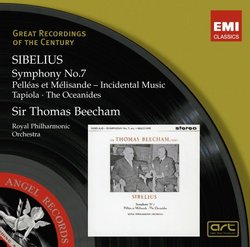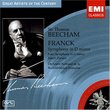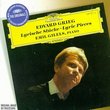| All Artists: Jean Sibelius, Thomas Beecham, Royal Philharmonic Orchestra Title: Sibelius: Symphony No. 7; Pelléas et Mélisande Incidental Music; Tapiola; The Oceansides Members Wishing: 0 Total Copies: 0 Label: EMI Classics Original Release Date: 1/1/2008 Re-Release Date: 3/11/2008 Genre: Classical Styles: Forms & Genres, Theatrical, Incidental & Program Music, Historical Periods, Modern, 20th, & 21st Century, Symphonies Number of Discs: 1 SwapaCD Credits: 1 |
Search - Jean Sibelius, Thomas Beecham, Royal Philharmonic Orchestra :: Sibelius: Symphony No. 7; Pelléas et Mélisande Incidental Music; Tapiola; The Oceansides
 | Jean Sibelius, Thomas Beecham, Royal Philharmonic Orchestra Sibelius: Symphony No. 7; Pelléas et Mélisande Incidental Music; Tapiola; The Oceansides Genre: Classical
|
Larger Image |
CD DetailsSimilar CDs |
CD ReviewsAn essential classic jsa | San Diego, CA United States | 04/04/2008 (5 out of 5 stars) "Thomas Beecham's relationship with Jean Sibelius spanned fifty years. He began conducting the composer's works in 1931 & his interpretations in the concert hall & on records were accepted as authoritatve especially in that Sibelius loved & endorsed his readings. As for these recordings, you would be hard pressed to find a more fulfilling disc packed with such an interesting variety of Sibelius's music; & the interpretations, of course, have the imprimatur of authority. The recordings come from the very early days of stereo (1955), but that should not be a deterrent to potential buyers as the sound is actually very attractive - both warm & crisp. Special mention should be made of Beecham's unforgettable reading of Tapiola. I first encountered it on an Angel Seraphim LP more than 30 years ago & was immediately struck by its haunting intensity. This truly is a once-in-a-lifetime reading that by itself is worth the price of this cd. Very highly recommended! " A priceless and ageless musical document! Hiram Gomez Pardo | Valencia, Venezuela | 04/07/2008 (5 out of 5 stars) "The past Thursday I received this album by Amazon U.K. and I must confess this has been one of the best anthological musical jewels any time ever made. Tapiola is simply out of this world. What Beecham achieves through the perfect conjunction of the inner voices, dramatic progression and poetic lyricism is totally absent in any other available recording. On the other hand the version of Pelleas reaches a level of sublime expressiveness like I had never heard before. The Seventh Symphony was always one the battle horses in Beecham's repertoire, he captured the numerous dramatic passages hovered by that Pastoral epic that makes it one of the most splendid recordings ever made. Perhaps with the sublime, electrifying and unsurpassed version made by Leonard Bernstein and the New York Philharmonic , this superb rendition must be included as the best second reading after Bernstein. The Oceanides is magnificent loaded of this Nordic atmosphere and gelid mystery, expression and conception of first-order. Don't miss this recording under no pretext. " Perfection. Erik Homenick | San Diego, California | 07/16/2008 (5 out of 5 stars) "EMI's GREAT RECORDINGS OF THE CENTURY is no misnomer. These truly are great recording and I've sort have begun "unofficially" collecting them. This recording of Sibelius standards with Sir Thomas Beechams and the Royal Phil is my latest acquisition in this series.
First of all, don't let the age of these recordings discourage you. Yes, these recordings were made in 1956 but the restored sound here is, quite honestly, better than a lot of the sound we get today from certain labels. If you crank up the volume, you will hear some slight tape hiss during quiter passages, but when the orchestra goes into a tutti, be prepared! Everything here is handled with the utmost artistry. Beecham's TAPIOLA is one of the best ever recorded. PELLEAS sounds rich and powerful. THE OCEANIDES has drive yet delicacy. And Beecham's rendering of Sibby's immortal 7TH SYMPHONY gives me the chills every time. (I've listened to it many times since I bought it!) This unique compilation is ideal as an introductory to Sibelius's later style. And despite its age, the sound is simply fantastic." |

 Track Listings (14) - Disc #1
Track Listings (14) - Disc #1


![Decca Recordings, 1965-1972 (Limited Edition) [Box Set]](https://nationalbookswap.com/cd//m/76/3476/6113476.jpg)
